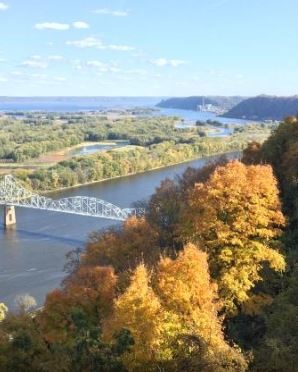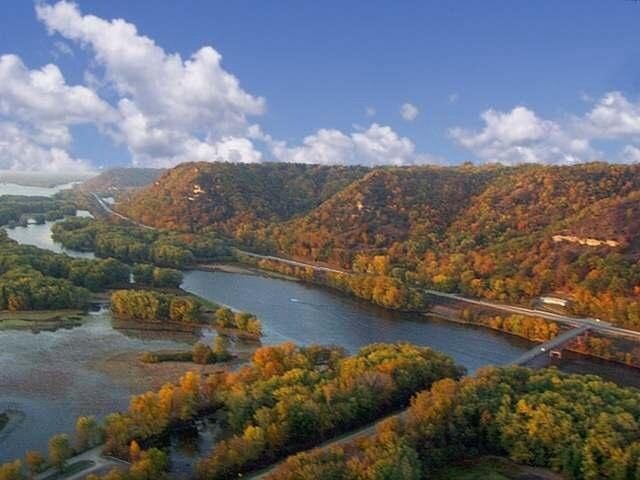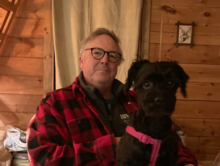Arguably the most beautiful part of Iowa is the 100-mile-long sliver of bluff land that lies along the Mississippi River from Bellevue to the Minnesota border. The northernmost part of this river corridor is also where Sauk Chief Blackhawk was defeated in 1832, opening the state to white settlement. Blackhawk's people had wandered across the river into what is now Wisconsin, violating a treaty they misunderstood, to access their traditional summering ground. U.S. troops drove women and children of Blackhawk’s tribe into the Mississippi where they drowned just north of what is now Lansing, Iowa.
Blackhawk died six years later and was buried in a grave overlooking the Des Moines River in southeast Iowa. His corpse was stolen shortly after, however, and the flesh boiled off so his skeleton could be exhibited. His remains were eventually moved to a Burlington, Iowa historical society at the request of territorial Governor Robert Lucas, where they were later lost in a fire. After the fire, a memorial to Blackhawk was constructed in the Iowaville Cemetery near Selma, Iowa. Governor Lucas’ Iowa City home, known as Plum Grove, is maintained as a historical site and he is buried in Oakland Cemetery in Iowa City. Lucas Street runs north to south on the east side of town.
Winnebago Chief Winneshiek (Coming Thunder) was an advisor and confidante of Blackhawk whose people occupied areas of northeast Iowa and southwest Wisconsin, and they were known to have encampments along the Upper Iowa River. Winneshiek was asked to side with U.S. troops in the Blackhawk War; he refused. The tiny Mississippi River village of DeSoto, Wisconsin is thought to have been built upon the burial ground of Winneshiek’s tribe, and Winneshiek himself is rumored to have been buried on the bluff that overlooks the village, aptly named Mount Winneshiek.

The names of Winneshiek and Blackhawk are familiar to Iowans mainly because they were attached to two of our counties. Numerous places, schools, sports teams, military weapons, and even a community college and a country club bear the Blackhawk name. Blackhawk helicopters have been used by the U.S. Army since 1979 and a movie and book were named after one that was shot down. The iconic Blackhawk bridge, made famous by the movie The Straight Story, is one of a series of four bridges that span the Mississippi between Lansing (IA) and DeSoto (WI); one of the other three is named for Winneshiek. The Mississippi River sloughs around both towns are known as the Winneshiek Bottoms, now a National Wildlife Refuge that was saved (barely) from agriculture’s insatiable appetite for land by the 2-year-old Izaak Walton League in 1924. There have been multiple failed attempts to turn the area into a national park.
I think a lot these days how these events are relevant to my own life. My ancestors were among those that poured into an Iowa made ‘open’ by Blackhawk’s defeat. They farmed in Des Moines, Davis, and Wapello (another Native American chief) Counties in southeast Iowa, and Warren County in south central Iowa. My uncle had a museum quality collection of Native American artifacts unearthed by his uncle’s plow in Davis County. I sometimes wonder if fate might have had me farming now, had my ancestors been better at it. My Iowa City home was in the same neighborhood as Governor Lucas’; I sold it to buy an old Amish cabin on the edge of DeSoto, WI, although I’m still pretty much anchored in Iowa City.

I often hear farmers proudly boast that they are the 5th or 6th on Nth generation of their family to earn a living off their patch of Iowa. “Never sell the home section” is a deathbed command made by many to their heirs across the generations, a concept foreign to the peoples of Blackhawk and Winneshiek.
I too am a 5th or 6th generation Iowan and see my rights as a non-farming citizen as being no different from those that farm. And whether your genes have been here for two hours or two centuries, I think your right to enjoy nature, and especially, clean water, should not be debased by the fact that you’re surrounded by farmable land. It’s not uncommon to hear some variation of “we’re a farm state, get used to it.” I reject that. And I think if the state is to have a prosperous future, it needs to be rejected by the masses. That rejection has been out in front of every essay that I have posted here.
I can sit in my humble little cabin and see the Iowa bluffs and the Blackhawk Bridge from seven miles away, the latter especially at night when it is decoratively lit. I wish I could put into words the irony I feel in being able to look up from typing this and see Iowa from afar. If you’ve never seen the Blackhawk Bridge, I suggest you plan a trip to Lansing because it will soon be gone and replaced with something better.
You’re reading the last essay that will be posted here. I’ve got some things to think about, one being a continuation of the blog (I hate the word blog) on another site. I have posted this essay on Blogspot; if you're so inclined you may want to bookmark the latter link. I've also preserved everything I've written over the past six months at Blogspot. Whether I write new ones to be posted at that site, I just don't know. My mind changes by the hour on this.

If I return to writing essays, they may be different from what I have written here in noticeable ways, either in tone, subject matter or both. It's undeniable that the essays' presence on the university domain imparted a 'fearlessness' character to the pieces that added to their appeal and maybe caused some to judge the writing as better (or worse) than what it really is. This is something for me to consider. I’d like to try some different things when it comes to writing, but I don't know if I'd be good at writing about much else. I was asked to write the obituary for my uncle mentioned here in this essay, and that also has been posted at Blogspot. So call that one "Make Obituaries Great Again," I suppose.
The pieces posted here have been read 200,000 times in total, and because of that, good fortune is among the feelings that I have right now. Thank you for reading. I hope I helped you learn something.—CJ
